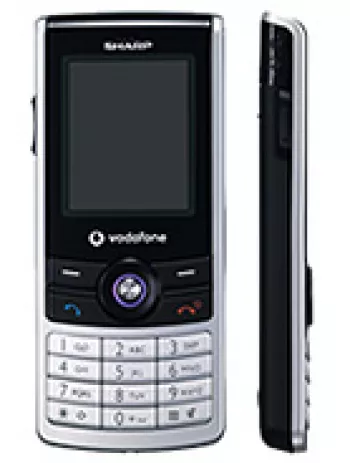
Design and Build
The Sharp TM200 features a compact and sturdy design typical of feature phones from the mid-2000s. The dimensions of 96 x 49 x 27 mm and a weight of 120 g make it a relatively portable device, easily fitting into a pocket or small bag. This phone follows a classic bar form factor, equipped with a Mini-SIM slot. The finish is robust, adding to its durability, ensuring that it could withstand the daily wear and tear expected from everyday use.
Display
The TM200 boasts a 2.2-inch TFT display, which, for its time, offered an impressive 256K color support. The resolution stands at 320 x 240 pixels, giving the device a density of around 182 PPI. This display specifications meant that users would enjoy crisp and reasonably vibrant graphics, well-suited for viewing photos and navigating through the phone's menus.
Camera
The phone features a 2MP primary camera with autofocus, a step up from many peers at the time which often lacked autofocus capabilities. It also includes an LED flash, enhancing photo quality in low-light conditions. The TM200 could record videos, offering users a basic multimedia experience. The focus on a feature-rich camera for a phone in this category underscored Sharp's attention to photography quality.
Performance and Storage
Operating as a feature phone, the Sharp TM200 does not rely on a sophisticated OS like its smartphone counterparts, instead running a proprietary operating system designed for basic functionality and efficiency. It comes with 9MB of internal storage, which could be expanded via an SD card, a feature that was particularly useful at a time when large internal storage options were uncommon. The call records accommodated 10 dialed, 10 received, and 10 missed numbers, enhancing user capacity to manage communications.
Battery Life
Equipped with a removable Li-Ion 840 mAh battery, the TM200 offers a stand-by time of up to 220 hours and a talk time of up to 3 hours and 20 minutes. This allows for extended use between charges, catering to users who require reliable battery performance. The removable battery design also enables users to carry and replace spare batteries, extending the device's overall lifespan.
Network and Connectivity
This device operates on GSM networks, supporting 900/1800/1900 bands, catering to a wide range of international frequencies, making it a versatile choice for global travelers. The TM200 includes GPRS Class 10 for mobile data, offering basic internet access capabilities suitable for its time period. Although it lacks EDGE, a faster data technology, it compensates with reliable performance on available networks. Bluetooth 1.1 ensures basic wireless connectivity for file transfers, though options like WLAN, radio, and advanced positioning tools are absent.
Sound and Multimedia
Although devoid of a loudspeaker and 3.5mm headphone jack, the TM200 offers downloadable polyphonic ringtones and supports vibration alerts, catering to basic audio needs. Users can enjoy some degree of entertainment through downloadable games and Java applets (MIDP 2.0), although multimedia possibilities remain limited compared to modern standards.
Messaging and Applications
For messaging, the device supports SMS, MMS, and Email, which were essential features for staying connected and productive on-the-go. The WAP 2.0/xHTML browser gives users access to a trimmed-down web experience, suitable for the mobile web pages of the time. The focus on practical and accessible communications functionality represents the hallmark of feature phones like the TM200.
Conclusion
In summary, the Sharp TM200 encapsulates the essence of early 2000s mobile phones, balancing reliability with moderate multimedia and communication features. While contemporary devices have far outstripped its capabilities, the TM200 remains a testament to the technological stepping stones that led to today's advanced smartphones. Its robust build, basic camera capabilities, and premium design for its time made it a noteworthy device in the era of feature phones.
Key Features of Sharp TM200
- GSM Technology supporting 2G bands (GSM 900 / 1800 / 1900)
- Compact dimensions: 96 x 49 x 27 mm
- Lightweight design: 120 g
- 2.2-inch TFT display with 256K colors
- High-resolution screen: 320 x 240 pixels (~182 ppi)
- Expandable memory with SD card slot
- 2 MP main camera with autofocus and LED flash
- Bluetooth 1.1 for wireless connectivity
- Removable Li-Ion 840 mAh battery
- Supports Java applications (MIDP 2.0)
- Includes basic messaging options: SMS, MMS, Email
- WAP 2.0/xHTML browser for internet browsing
Disadvantages of Sharp TM200
- Lacks EDGE support for faster data transfer.
- The device has been discontinued, limiting support and availability.
- Low internal memory of only 9MB, requiring an SD card for more storage.
- No loudspeaker functionality, limiting audio options.
- No 3.5mm headphone jack, restricting headphone use.
- Bluetooth version 1.1 is outdated, affecting connectivity with newer devices.
- No WLAN support for wireless internet connection.
- Absent positioning features, such as GPS.
- No built-in radio functionality.
- The screen-to-body ratio is low, offering limited display space.
- High initial price of about 460 EUR for its provided features.
- Limited talk time of up to 3 hours and 20 minutes.

View Also
More Phones
All Rights Reserved +14306 Phones © Mobilawy 2026

























